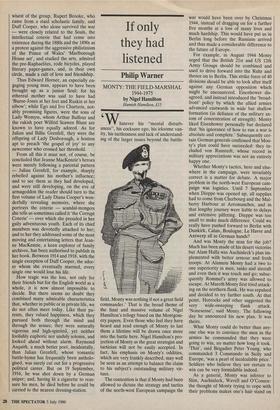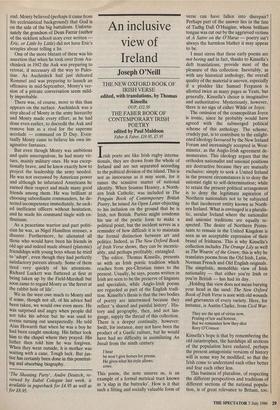If only they had listened
Philip Warner
MONTY: THE FIELD-MARSHAL 1944-1975
by Nigel Hamilton
Hamish Hamilton, £15
Whatever his "mental disturb- ances", his cocksure ego, his irksome van- ity, his tactlessness and lack of understand- ing of the larger issues beyond the battle- field, Monty was nothing if not a great field commander.' That is the broad theme of the final and massive volume of Nigel Hamilton's trilogy based on the Montgom- ery papers. Even those who feel they have heard and read enough of Monty to last them a lifetime will be drawn once more into the battle here. Nigel Hamilton's pro- jection of Monty as the great strategist and tactician will not be easily accepted. In fact, his emphasis on Monty's oddities, which are very frankly described, may well be seen as an attempt to balance the claim to his subject's outstanding military vir- tues.
The contention is that if Monty had been allowed to dictate the strategy and tactics of the north-west European campaign the war would have been over by Christmas 1944, instead of dragging on for a further five months at a loss of many lives and much hardship. This would have put us in Berlin long before the Russians arrived and thus made a considerable difference to the future of Europe.
For example, in August 1944 Monty urged that the British 21st and US 12th Army Groups should be combined and used to drive forward into the Ruhr and thence on to Berlin. This strike force of 40 divisions should be able to look after itself against any German opposition which might be encountered. Eisenhower dis- agreed, and instead introduced the 'broad- front' policy by which the allied armies advanced eastwards in wide but shallow formation (in defiance of the military ax- iom of concentration of strength). Monty liked Eisenhower personally but declared that 'his ignorance of how to run a war is absolute .and complete.' Subsequently cer- tain German generals confirmed that Mon- ty's plan could have succeeded: they in- cluded von Runstedt, whose record in military appreciations was not an entirely happy one.
Whether Monty's tactics, here and else- where in the campaign, were invariably correct is a matter for debate. A major problem in the north-west European cam- paign was logistics. Until 7 September when Dieppe was opened up, all supplies had to come from Cherbourg and the Mul- berry Harbour at Arromanches, and in that lengthy journey were liable to delays and extensive pilfering. Dieppe was too small to make much difference. Could we really have pushed forward to Berlin with Dunkirk, Calais, Boulogne, Le Havre and Antwerp all in German hands?
And was Monty the man for the job? Much has been made of his desert victories but Alam Haifa was Auchinleck's plan im- plemented with better armour and fresh troops. At Alamein Monty had a two to one superiority in men, tanks and aircraft and even then it was touch and go; subse- quently Rommel's army was allowed to escape. At Mareth Monty first tried attack- ing on the northern flank. He was repulsed and decided to try further south. At that point, Horrocks and other suggested the very wide-sweeping flank attack. Nonesense', said Monty. The following day he announced his new plan. It was theirs.
What Monty could do better than any- one else was to convince the men in the armies he commanded that they were going to win, no matter how long it took. `That', said Brigadier Peter Young, who commanded 3 Commando in Sicily and Europe, 'was a pearl of incalculable price.' Soldiers who believe they are certain to win can be very formidable indeed.
As a general, Monty was inferior to Slim, Auchinleck, Wavell and O'Connor: the thought of Monty trying to cope with their problems makes one's hair stand on end. Monty believed (perhaps it came from his ecclesiastical background) that God is on the side of the big battalions. Unfortu- nately the grandson of Dean Farrar (author of the sickliest school story ever written Eric, or Little by Little) did not have Eric's scruples about telling a lie. One of the more blatant of these was his assertion that when he took over from Au- chinleck in 1942 the Auk was preparing to retreat, if necessary all the way to Pales- tine. As Auchinleck had just defeated Rommel and was preparing to launch an offensive in mid-September, Monty's ver- sion of a private conversation seem mild- ly improbable.
There was, of course, more to this than appears on the surface. Auchinleck was a step ahead of Monty in the army hierarchy and Monty made every effort, as he had done even earlier, to discredit the Auk and remove him as a rival for the supreme accolade — command on D Day. Even- tually Monty came to believe his own im- aginative fantasies.
But even though Monty was ambitious and quite unscrupulous, he had many vir- tues, mainly military ones. He was excep- tionally brave, and he knew exactly how to project the leadership the army needed. He was not overawed by American power and although he infuriated Americans he earned their respect and made many good friends among them. He was brilliant at choosing subordinate commanders, he de- tected incompetence immediately, he sack- ed inefficient officers without hesitation, and he made his command tingle with en- thusiasm.
As a peacetime warrior and part politi- cian he was, as Nigel Hamilton stresses, a disaster. Furthermore, he alienated all those who would have been his friends in old age and indeed made absurd (platonic) friendships with young boys whom he tried to 'adopt', even though they had perfectly satisfactory parents already. Some of them tired very quickly of his attentions. Richard Luckett was flattered at first at being taken up by the Field-Marshall but soon came to regard Monty as 'the ferret at the rabbit hole of life'.
We in the west owe much to Monty and if some, though not all, of his advice had been taken, we would owe even more. He was surprised and angry when people did not take his advice but he was used to events turning out unexpectedly. He told Alan Howarth that when he was a boy he had been caught smoking. His father took him to the chapel where they prayed. His father then told him he was forgiven. When they went outside, h is mother was waiting with a cane. Tough luck. But jus- tice has certainly been done in this penetrat- ing and absorbing biography.



















































 Previous page
Previous page